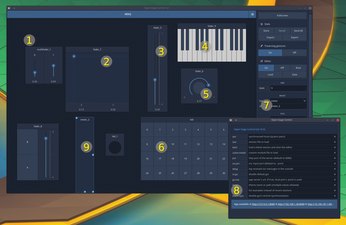FOSSPicks
FOSSPicks

© Graham tears himself away from updating Arch Linux to search for the best new free software.
Sparkling gems and new releases from the world of Free and Open Source Software
Hardware automation
Open Stage Control 0.16.5
There's no doubt that the Musical Instrument Digital Interface (MIDI) standard revolutionized music. At its most basic, it enabled musicians and producers to record and play back a performance from a MIDI-equipped keyboard or synthesizer. Then drums, then lights, and then almost everything else. But it was also the harbinger of modern pop music, with its obsession with automation and control over every single aspect of a piece of music. From the swing between each note to painfully autotuned vocals, pop has never been the same. As soon as people got used to dragging notes with a mouse, they wanted to drag everything.
Rants about modern music aside, MIDI is still amazing. It has aged even better than Depeche Mode's Construction Time Again ("Everything Counts," excepting) and was born in the same year – 1983. But it was never designed for this crazy interconnected world we find ourselves in. MIDI transfers data at a serial rarity of 31250 bits per second, and the binary package that holds the data has more in common with old modems than modern modulars. This is where the Open Sound Control (OSC) protocol comes in handy. It's an open, modern, hardware-agnostic protocol that's designed for the real-time communication of signals across modern connections. At its core is a URI schema with high-resolution timing and data encapsulation. As with XML for text, OSC allowed creators to design their own specifications and then easily transmit the data encapsulated within OSC. It works brilliantly, whether you're connected via USB or the Internet, and it's really not as complicated as it sounds.
OSC hasn't yet cracked the hardware synthesizer market, but it's used for all kinds of music and multimedia applications, including Ardour, Pure Data, and Renoise. But it's also perfect for automating lights and other hardware, such as mixers. But, OSC on Linux is otherwise lacking. However, Open Stage Control is one of the best OSC tools I've seen. In one mode, it's an interface designer, letting you add faders, buttons, piano keyboards, VU meters, and many more elements to a blank canvas. With those widgets arranged, you can then define how they send and receive OSC data to your hardware and software. Turn the editor off, and you then use the application as you would a mixer, or a virtual synthesizer, or a remote control. Your arrangement can then be saved as a JavaScript session and loaded again, alongside other templates created by other people. Because Open Stage Control is built with Node.js/Electron, it even runs within Chrome 49 or later. What the application does depends on how you create your templates, and it reminds me of applications like Lemur or TouchOSC for popular tablets, but I've not seen any application on Linux that does this so well, and looks so good. If you're interested in any kind of remote applications, even if that doesn't involve esoteric synthesizer programming, Open Stage Control is definitely worth a few hours of your attention.
Project Website
 1 Widgets: Many different graphical elements can be added to the session. 2 Faders: Use buttons, sliders, or XY faders to send data. 3 Tabbed view: Several pages can be loaded into a single session. 4 Keyboard data: Unlike MIDI, keyboards can send any kind of data you want them to. 5 Update GUI via OSC: Send commands to OSC to change the UI and add widgets. 6 Matrices: Some widgets can be automatically grouped as matrices. 7 Editor: Add, remove, and code widgets to do anything you want. 8 CLI Options: Change ports or load share sessions. 9 Meters: Various metering widgets represent incoming OSC data.
1 Widgets: Many different graphical elements can be added to the session. 2 Faders: Use buttons, sliders, or XY faders to send data. 3 Tabbed view: Several pages can be loaded into a single session. 4 Keyboard data: Unlike MIDI, keyboards can send any kind of data you want them to. 5 Update GUI via OSC: Send commands to OSC to change the UI and add widgets. 6 Matrices: Some widgets can be automatically grouped as matrices. 7 Editor: Add, remove, and code widgets to do anything you want. 8 CLI Options: Change ports or load share sessions. 9 Meters: Various metering widgets represent incoming OSC data.
System optimizer
Buy this article as PDF
(incl. VAT)
Buy Linux Magazine
Subscribe to our Linux Newsletters
Find Linux and Open Source Jobs
Subscribe to our ADMIN Newsletters
Support Our Work
Linux Magazine content is made possible with support from readers like you. Please consider contributing when you’ve found an article to be beneficial.

News
-
Fedora Asahi Remix 41 Available for Apple Silicon
If you have an Apple Silicon Mac and you're hoping to install Fedora, you're in luck because the latest release supports the M1 and M2 chips.
-
Systemd Fixes Bug While Facing New Challenger in GNU Shepherd
The systemd developers have fixed a really nasty bug amid the release of the new GNU Shepherd init system.
-
AlmaLinux 10.0 Beta Released
The AlmaLinux OS Foundation has announced the availability of AlmaLinux 10.0 Beta ("Purple Lion") for all supported devices with significant changes.
-
Gnome 47.2 Now Available
Gnome 47.2 is now available for general use but don't expect much in the way of newness, as this is all about improvements and bug fixes.
-
Latest Cinnamon Desktop Releases with a Bold New Look
Just in time for the holidays, the developer of the Cinnamon desktop has shipped a new release to help spice up your eggnog with new features and a new look.
-
Armbian 24.11 Released with Expanded Hardware Support
If you've been waiting for Armbian to support OrangePi 5 Max and Radxa ROCK 5B+, the wait is over.
-
SUSE Renames Several Products for Better Name Recognition
SUSE has been a very powerful player in the European market, but it knows it must branch out to gain serious traction. Will a name change do the trick?
-
ESET Discovers New Linux Malware
WolfsBane is an all-in-one malware that has hit the Linux operating system and includes a dropper, a launcher, and a backdoor.
-
New Linux Kernel Patch Allows Forcing a CPU Mitigation
Even when CPU mitigations can consume precious CPU cycles, it might not be a bad idea to allow users to enable them, even if your machine isn't vulnerable.
-
Red Hat Enterprise Linux 9.5 Released
Notify your friends, loved ones, and colleagues that the latest version of RHEL is available with plenty of enhancements.

